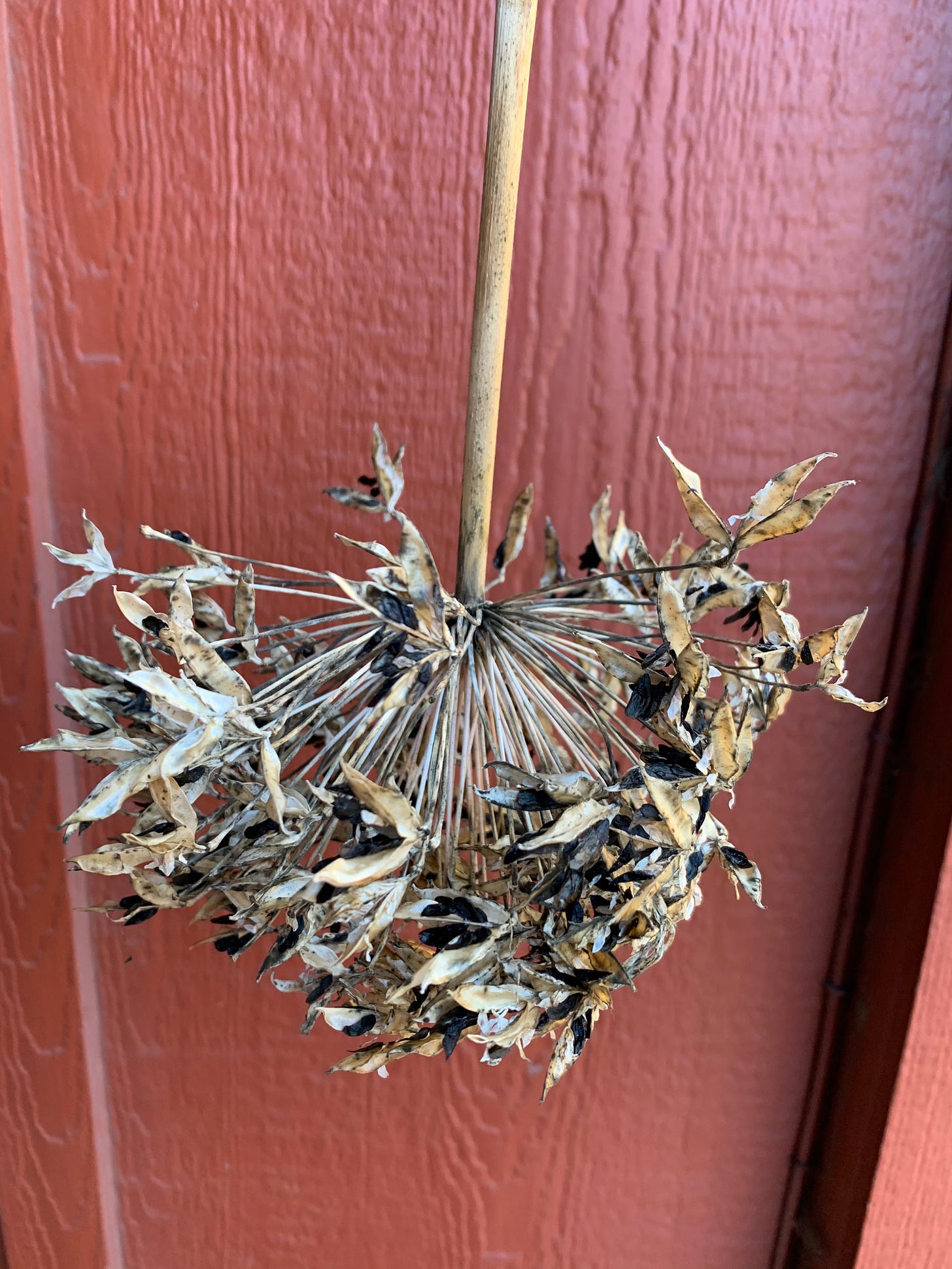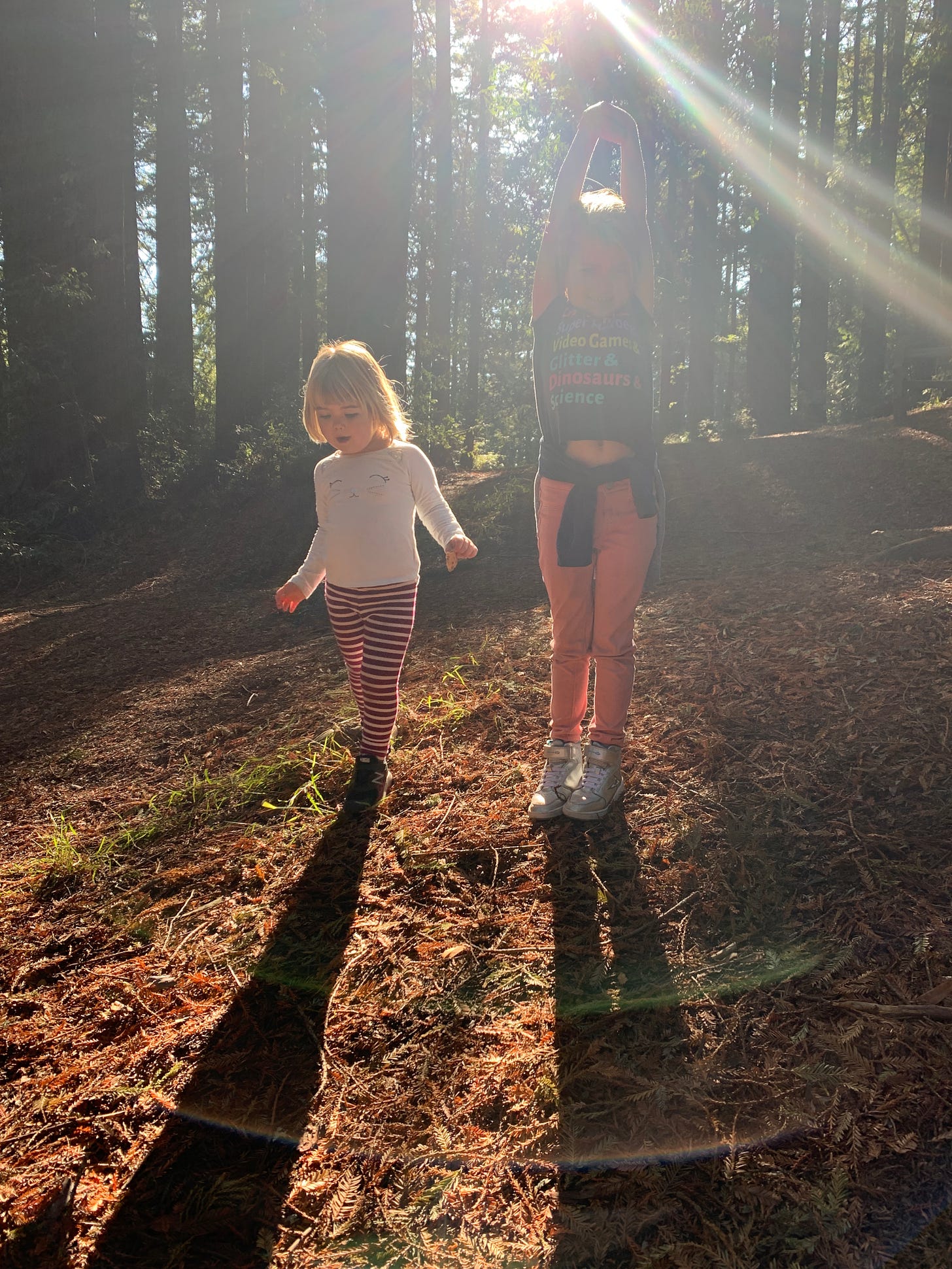Maturing my approach to the climate crisis
for those still figuring out how to respond wisely to this planetary moment
Real talk: my attention and attendance to the climate crisis has felt profoundly immature up until now. I’d sum it up as a wild swing between tiny, not meaningless, but not particularly impactful, behavior change and apocalyptic shame-spiraling.
First, there is the behavioral stuff. In moments, I feel soothed by painstakingly collecting the little detritus of soft plastic that unceasingly passes through our home and adding it to the Ridwell recycling program our cohousing community has newly subscribed for. I’m smug with my little ziplock bags. We’re going above and beyond. We don’t just recycle and compost with the city; we have our own additional compost and pay for an extra recycling service that accepts soft plastic. You should see the charts we’ve created and the emails that circulate in the community about the exact types of plastic that are and aren’t accepted. We sure can talk a thing to death.
Speaking of death, when I’m not righteously squirreling away my plastic bags or patting myself on the back that my kids have no idea what a gas station is all about and we have solar panels, I’m freaking out about the apocalypse. Or let me be more honest, I’m feeling ashamed about not freaking out about the apocalypse. When my apocalypse oriented friends bring it up, and boy do they bring it up, I feel like I’ve just slammed into the car in front of me on a residential street. Like, how did I not notice the earth was dying while I was scream singing Kelly Clarkson? Shit. Shit. Shit. Courtney, focus!
This repetitive swinging—between little domestic practices and doom scrolling about the apocalypse I can’t quite seem to keep front of mind—is inadequate. I know. I’ve been failing to meet this moment. And yet I have struggled to figure out a more wholistic and systemic way to relate to the climate crisis.
I used to think it was a failure born of proximity. My privilege has largely shielded me from being directly impacted by the effects of climate change. But then the skies turned red and dangerous. One of my kids spends her schools days inside of a portable which is miserably hot when it’s hot and miserably cold when it’s cold. Watching her go to school with three jackets on makes me feel sad and helpless. Checking the air quality constantly when the smoke from a nearby fire blows through is jarring.
But then, and this is another thing I’m embarrassed to admit, the moment passes. The air clears up. We have a mild fire season. I grow used to seeing Maya in her many coats. I forget that there was a time I didn’t even know the acronym AQI. Essayist Maggie Nelson seems to have my number when she writes:
“The tragedy of global warming is in part a tragedy of greed, and in part a tragedy of the human mind’s—or some human minds’—failure to apprehend or care about deep time.”
So maybe this is my problem, our problem—many of us are shit at responding to deep time. Particularly those of us whose proximity to the climate crisis is still merely inconvenient or sad, as opposed to truly oppressive. But as I understand it, time is running out, so we better learn how to get better at it.
I need to learn how to get better at it—live in a way aligned with both the reality of the climate crisis and my love for the natural world, Redwood and Aspen trees, little baby quails, sea otters and seahorses and poppies and peas fresh off the vine, and, well, yes, my very own children, who deserve a decent life where they can breathe the air and swim in the ocean. My motivation will no doubt come from fear, but I also want it to be born from love.
I have a feeling that alignment is something less transactional and melodramatic than what I’m experiencing now. Something more collective, relational, maybe even ritualistic; the kind of contemplation and action that keeps the main thing the main thing. I know one of the tricks of sensing and honoring deep time is to slow the heck down, to avoid performance and the seduction of behavior-change-as-righteous-distraction, to listen to people further along on this journey of climate consciousness, to be in intergenerational community with all of this grappling, to follow the damn money.
I know my maturity around this will no doubt come from, among others, an unlikely source: listening to my children—what are they seeing beyond the horizon? What do they want our family to do to respond to the climate crisis? What worlds are they scared of and what worlds do they dream of?
And, of course, listening to those who have been consistently and dramatically impacted by climate change already, like Dekila Chungyalpa, and Collette Pichon Battle, and Rukka Sombolinggi & Mina Setra.
I also need models—people that I relate to who are moving through the warming world in a way that is multi-dimensional (holding the grief and the possibility), being strategic and impactful with their energy, and constantly reaching out and pulling more people in. (I have experienced models working so powerfully along these lines with integrating schools, so I know how it feels. Indeed, you can’t be what you can’t see.) I need these people, not necessarily to be those giving their entire lives to this movement. I think part of my failure to meet the moment has been a dichotomy—in the culture and in my own mind—that you are either an all-in, statistic-spouting, vegan-eating environmentalist or you are not. I need a middle path and people to walk alongside.
I am going to look for organizations that can organize me—get me plugged into opportunities to think critically about where my money is invested, support exciting policy efforts like the teenagers in Montana who are a case study in courage and strategy, and show up when bodies are needed on the line, any line.
I need you, my readers, to help me. Where are you in this journey? Are you a middle path model or have you found others who are? How do you do the baseline behavior change without having that distract you from the big stuff? What is the right big stuff for an average human writer/mom to focus on?
Teach me!
Stay tuned for a Q&A on all of this Friday and five climate-related recommendations in the Sunday 5 for paid subscribers. (Don’t get the Sunday 5? You probably haven’t upgraded to paid. Now is a great time! It’s got a wildly high open rate so I think people find it useful. I would love to share it with you, too.)






What gave me an extremely valuable opening in thinking about climate was Project Drawdown.
That assembly of scientists and NGOs working on global warming has identified in priority order and very explicitly what we can do as individuals or as organizations and measures what the impact would be of progress in those areas.
I developed my personal efforts from that baseline. Some are things I can do in how I live. Some are ideas I can share as an advocate. Some things point to organizations I can support financially who can do things we as scattered individuals cannot do, like holding governments and large corporate entities into account on the international stage.
My best angle is working to stop and reverse deforestation, but there are a variety of areas on which a person might usefully focus.
One weekend camping, I was walking down a quiet dirt road, deep in thought, when a giant truck suddenly roared past me, breaking my reverie and choking me in a plume of exhaust. I suddenly had a vision of myself as a very old lady, telling my grandkids a story about how "cars could blow poisonous fumes right in your face and did it every day!" And the kids are astonished that we once lived like this. I've worked in the environmental/climate field for a couple decades, so I've been marinating in the topic for a awhile, but that random vision was galvanizing because it gave me a personal point in deep time to work toward. I often tell myself, "I want to live long enough to see this!" I am otherwise someone who struggles to see my life even 5 years in the future.
The other day, I was visiting my nephew, who was showing me around his first home, where he lives with his girlfriend. The backyard was a wide expanse of dead grass and weeds. I said, "Wow look at that clean slate. You could do so much back there!" He said, "Yeah, but it's just a rental. I'm not going to do anything if we don't own it and we're just gonna move out one day." I said, "DUDE. I dug and planted and landscaped and created beauty at every shithole rental I lived in my entire adult life." I'm a habitual place-maker. I LOVE transforming dead spaces into little Edens. My climate motivations derive from that same source; I'm working toward a verdant vision of beauty that is on the other side of the climate crisis.
For the last few years, the focus of my work has been building electrification - how to use the sun on my roof to power all my appliances, and how to load shift to do things when energy is cleanest and cheapest. I'm now dipping into water cycles, too, installing greywater and a Flume monitor. All this to say that I am geeking out on getting very intimate with my family's energy and water needs and patterns, and scheming ways to meet them with sun, rain, waste water. It's like a game. I'm a curious monkey, who grew up watching Gilligan's Island. I want to be the professor, making systems with bamboo and coconuts!
Lastly, I want to mention one more strong motivation: I consider fossil fuels the Death Star. They are destabilizing the climate, making us and all our fellow creatures sick, and polluting at every step. BUT ALSO, fossil fuel money bankrolls every political movement I abhor and fight against: the villains working nonstop to shred civil rights, the social safety net, and democracy are propped up with fossil fuel money. And I don't want to give them a single fucking dollar. From this fierceness I feel, I am trying to figure out ways to live that starve those movements of their dirty Death Star profits.